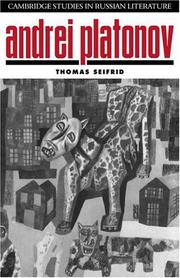| Listing 1 - 2 of 2 |
Sort by
|
Book
ISBN: 1618110012 1934843571 9781618110015 9781618116970 1618116975 1934843083 9781934843086 9781934843574 Year: 2009 Publisher: Boston : Academic Studies Press,
Abstract | Keywords | Export | Availability | Bookmark
 Loading...
Loading...Choose an application
- Reference Manager
- EndNote
- RefWorks (Direct export to RefWorks)
Written at the height of Stalin's first "five-year plan" for the industrialization of Soviet Russia and the parallel campaign to collectivize Soviet agriculture, Andrei Platonov's The Foundation Pit registers a dissonant mixture of utopian longings and despair. Furthermore, it provides essential background to Platonov's parody of the mainstream Soviet "production" novel, which is widely recognized as one of the masterpieces of twentieth-century Russian prose. In addition to an overview of the work's key themes, it discusses their place within Platonov's oeuvre as a whole, his troubled relations with literary officialdom, the work's ideological and political background, and key critical responses since the work's first publication in the West in 1973.
Politics and literature --- History --- Platonov, Andreĭ Platonovich, --- Criticism and interpretation. --- Literature --- Literature and politics --- Political aspects --- Платонов, Андрей Платонович, --- Płatonow, Andriej, --- Platonow, Andrej, --- Платонов, Андрей, --- Platonov, Andreĭ, --- Климентов, Андрей Платонович, --- Klimentov, Andreĭ Platonovich, --- Платонов, А. --- Platonov, A. --- Platonov, Andrej, --- Platonov, Andrey, --- פלטונוב, אנדריי, --- Platonov, Andreĭ Platonovich

ISBN: 052140522X 052102675X 0511519648 9780521405225 9780511519642 9780521026758 Year: 1992 Volume: vol *6 Publisher: Cambridge : Cambridge University Press,
Abstract | Keywords | Export | Availability | Bookmark
 Loading...
Loading...Choose an application
- Reference Manager
- EndNote
- RefWorks (Direct export to RefWorks)
The Soviet writer Andrei Platonov (1899-1951) belongs to a Russian philosophical tradition that includes such figures as Vladimir Solov'ev, Mikhail Bakhtin and Boris Pasternak. This 1992 study investigates the interrelation of themes, imagery and the use of language in his prose. Thomas Seifrid shows how Platonov was particularly influenced by Russian utopian thought of the late nineteenth and early twentieth centuries, and how his world view was also shaped by its implicit dialogue with the 'official' Soviet philosophy of Marxism-Leninism, and later with Stalinist utopianism. He discusses how in Platonov's masterpieces of the late 1920s and early 1930s linguistic parody comes together with existential angst and dystopian doubts about the course of Soviet history. The study concludes with consideration of the works Platonov wrote from 1934 to 1951, in the age of socialist realism. In these, he manoeuvred to preserve some of the essentials of his earlier world view and verbal manner while fusing them to the literary formulae that were expected of him.
Filosofie in de literatuur --- Philosophie dans la littérature --- Philosophy in literature --- Réalisme socialiste dans la littérature --- Socialist realism in literature --- Socialistische realisme in de literatuur --- Philosophy in literature. --- Socialist realism in literature. --- Platonov, Andrei Platonovich, --- Criticism and interpretation --- Platonov, Andreĭ Platonovich, --- Philosophie dans la littérature --- Réalisme socialiste dans la littérature --- Platonov, Andreĭ Platonovich, --- Platonov, Andreï Platonovich --- Platonov, Andre i Platonovich, 1899-1951 - Criticism and interpretation. --- Arts and Humanities --- Literature --- Platonov, Andreĭ Platonovich, - 1899-1951 - Criticism and interpretation --- Criticism and interpretation. --- Платонов, Андрей Платонович, --- Płatonow, Andriej, --- Platonow, Andrej, --- Платонов, Андрей, --- Platonov, Andreĭ, --- Климентов, Андрей Платонович, --- Klimentov, Andreĭ Platonovich, --- Платонов, А. --- Platonov, A. --- Platonov, Andrej, --- Platonov, Andrey, --- פלטונוב, אנדריי, --- Platonov, Andreĭ Platonovich --- Platonov, Andreĭ Platonovich, - 1899-1951
| Listing 1 - 2 of 2 |
Sort by
|

 Search
Search Feedback
Feedback About UniCat
About UniCat  Help
Help News
News